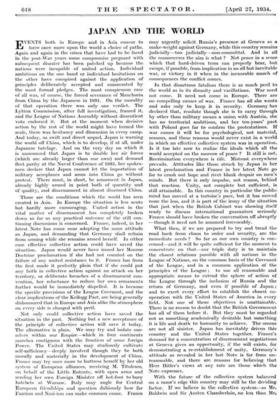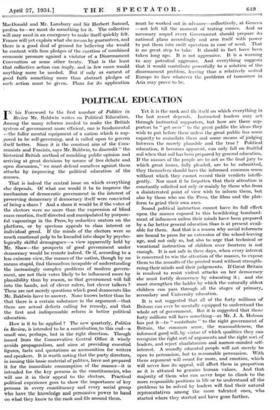JAPAN AND THE WORLD
EVENTS both in Europe and in Asia concur to force once more upon the world a choice of paths. Again and again in the crises that have had to be faced in the post-War years some compromise pregnant with subsequent disaster has been patched up because the nations were incapable of united action. Individual ambitions on the one hand or individual hesitations on the other have conspired against the application of principles deliberately accepted and consecrated by the most formal pledges. The most conspicuous case of all was, of course, the forced severance of Manchuria, from China by the Japanese in 1931. On the morality of that operation there was only one verdict. The Lytton Commission, after full investigation, framed it, and the League of Nations Assembly without dissentient vote endorsed it. - But at the moment when decisive action by the rest of the world might have turned the scale, there was hesitancy and dissension in every camp. And today, as swift and direct sequel, Japan is warning the world off China, which is to develop, if at all, under Japanese tutelage. And on the very day on which it is announced that Japan is to double her air forces (which are already larger than our own) and demand fleet parity at the Naval Conference of 1935, her spokes- men declare that Japan cannot let the importation of military aeroplanes and arms into China go without protest. There must, in short, be armament in Japan, already highly armed in point both of quantity and of quality, and disarmament in almost disarmed China.
Those are the conditions which the world has seen created in Asia. In Europe the situation is less acute but hardly more encouraging. United action in the vital. matter of disarmament has completely broken down so far as any practical outcome of the still con- tinuing discussions is concerned. France, indeed, in her latest Note has come near adopting the same attitude as Japan, and demanding that Germany shall refrain from arming while she remains armed herself. In either case effective collective action could have saved the situation. Japan would never have issued her Monroe Doctrine proclamation if she had not counted on the failure of any united resistance to it. France has from the first made it perfectly plain that if she .could put any faith in collective action against an attack on her territory, or deliberate breaches of a disarmament con- vention, her reluctance to reduce her own armaments further would be immediately dispelled. It is because the specific provisions of the League Covenant, and the clear implications of the Kellogg Pact, are being generally dishonoured that in Europe and Asia alike the atmosphere on every side is charged with peril.
Not only could collective action have saved the situation in the past. Nothing but a new acceptance of the principle of collective action will save it today. The alternative is plain. We may try and isolate our- selves within our Empire—which in four continents marches contiguous with the frontiers of some foreign Power. The United States may studiously cultivate self-sufficiency--deeply involved though they be both morally and materially in the development of China. France may try once more to buttress herself by her old system of European alliances, receiving M. Titulesco, on behalf of the Little. Entente, with open arms and sending her own Foreign Minister off hot-foot to bury hatchets at Warsaw. Italy may angle for Central European friendships and question dubiously how . far Fascism and Nazi-ism can make common cause. France may urgently solicit Russia's presence at Geneva as a make-weight against Germany, while this country remains judicially—too judicially—non-committal. And in all the manoeuvres the aim is what ? Not peace in a sense which that hard-driven term can properly bear, but escape, if possible, from implication in an all but inevitable war, or victory in it when in the inexorable march of consequences the conflict comes.
In that disastrous fatalism there is as much peril to the world as in its disunity and vacillations. War need not come. It need, not come in Europe. There are no compelling causes of war. France has all she wants and asks only to keep it in security. Germany has declared that, resolute though she is to carry through by other than military means a union with Austria, she has no territorial ambitions, and her ten-years' pact with Poland goes far to confirm the protestations. If war comes it will be for psychological, not material, reasons, and those reasons would never exist in a world in which an effective collective system was in operation. Is it too late now to realize the ideals whiCh all the world accepted on the morrow of peace ? It still is not. Recrimination everywhere is rife. Mistrust everywhere prevails. Attitudes like those struck by JaPan in her latest proclamation and France in her latest Note go far to crush out hope and rivet blank despair on men's minds. But there is only impulse, not reason, behind that reaction. Unity, not complete but sufficient, is still attainable. In this country in particular the public mind has moved at a tortoise's pace, but it has moved none the less, and it is part of the irony of the situation that just when the British Cabinet was showing itself ready to discuss international guarantees. seriously France should have broken the conversation off abruptly —though it need not be assumed irrevocably.
What then, if we are prepared to try and tread the road back from chaos to order and security, are the immediate needs ? So far as our own country is con- cerned—and it will be quite sufficient for the moment to concentrate on that—our triple duty is to maintain the closest relations possible with all nations in the League of Nations, on the common basis of the Covenant of the League, and in a common application of the principles of the League ; to use all reasonable and appropriate means to extend the sphere of action of the League through the inclusion of Russia and the return of Germany, and even if possible of Japan; and to exert every effort to establish the closest co- operation with the United States of America in every field. Not one of those objectives is unattainable. There is no reason to doubt that the British Government has all of them before it. But they must be regarded not as something academically desirable but something it is life and death to humanity to achieve. The omens are not all sinister. Japan has inevitably driven this country and the United States together. France's demand for a concentration of disarmament negotiations at Geneva gives an opportunity, if the will exists, for demonstrating a re-establishment of unity. Germany's attitude as revealed in her last Note is far from un- reasonable, and there are reasons for believing that Herr Hitler's views at any rate are those which the -Note . expresses.
With the future of the collective system balanced on a razor's edge this country may still be the deciding factor. If we believe in the collective systein—as Mr. Baldwin and Sir Austen Chamberlain, no less Than MAI MacDonald and Mr. Lansbury and Sir Herbert Samuel, profess to—we must do something for it. The collective will may need in an emergency to make itself quickly felt. France will yet explain what she means by guarantees, and there is a good deal of ground for believing she would be content with firm pledges of the exertion of combined economic pressure against a violator of a Disarmament Convention or some other treaty. That is the least that collective action can imply, and in few cases would anything more be needed. But if only as earnest of good faith something more than abstract pledges of such action must be given. Plans for its application must be worked out in advance—collectively, at Geneva -not left till the moment of testing comes. And as necessary sequel every Government should prepare its national plans accordingly and arm itself with power to put them into swift operation in case of need. That is no great step to take. It should in fact have been taken long ago. It is not aggressive. It is a warning to any liotential aggressor. And everything suggests that it would contribute powerfully to a solution of the disarmament problem, leaving thus a relatively united Europe to face whatever the problems of tomorrow in Asia may prove to be.













































 Previous page
Previous page